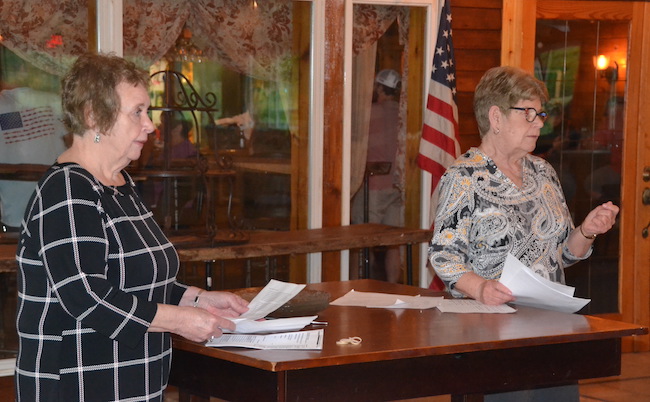County will hire all election inspectors with pay at $15 an hour
LYNDONVILLE – Orleans County elections officials are adapting to many changes in elections and bracing for more.
One big change this year has all the election inspectors as county employees, and all will be paid the same $15 an hour. Those inspectors can out in 16 hours during an election . They also will be paid $25 for a training session.
The inspectors have been hired by the towns on a contractual basis and pay rates varied among the 10 towns. The county will now do all the payroll and will take out FICA for Social Security benefits and Medicare.
The county will then charge back the towns two thirds of the cost, with the county paying a third this year. Lynne Johnson, Legislature chairwoman, said the county decided to pay the third because the change was made mid-year when towns already had their budgets set.
The change was the focus of the monthly meeting on Thursday night of Orleans County Association of Municipalities at the White Birch Golf Course. Richard Moy, the Clarendon town supervisor, said he didn’t like the chargebacks when the inspectors are being hired by the county and on the county payroll.
He said the county also hit the towns with chargebacks for community colleges, when the expense tops $2,050,000. That was instituted in 2021, but the costs never exceeded $2,050,000. In 2020, the county was billed $2,214,515 for charge-backs to the home county of a community college student. In 2021, the cost decreased to $1,839,535, a drop of $374,980.
The county charges back many of the election costs to the towns.
“What else is coming?” Moy asked county officials about charge backs.
The state put the law in place in 2005 about inspectors being on the county payroll. But Orleans officials didn’t realize it until the county treasurer was at a conference and the issue was discussed.
Kathy Case, one of the county election commissioners, said there are many proposed state laws for more changes in elections. One proposal would make all election commissioners full-time employees. Case and Janice Grabowski are both appointed election commissioners by the County Legislature, with Case from the Republican Party and Grabowski from the Democratic Party. They are both part-time.
Grabowski said the job should be part-time in Orleans County. She is advocating to the state if the positions are made full-time there be a cutoff based on the population size of a county. She said smaller counties like Orleans should be able to keep the positions at part-time. The county, which has about 40,000 people, has full-time deputy election commissioners and other part-time employees.
“It makes sense for the bigger counties, but we don’t need it,” Grabowski said. “We have good deputies and part-time staff.”
It will be a busy next few months for the elections office with two primaries and a general election. All will have early voting.
The June 28 primary has early voting at the Board of Elections in Albion from June 18 through June 26.
There is also a primary on Aug. 23 with the general election on Nov. 8.
The elections for state and congressional seats include new district maps this year. Grabowski and Case said the congressional redistricting split the town of Clarendon with about two-thirds in the 24th District and a third in the 25th District.
However, about 15 parcels of Clarendon’s first voting district are oddly included in the other district. Clarendon has three voting districts. Grabowski and Case said they have contacted the state and requested the town’s voting district one stay intact and not be split.
“We are inquiring if we can keep Clarendon One altogether,” Case said.
The office has needed to respond to numerous state laws in the past three years.
“There have been over 100 new election laws since 2019 and they’re still coming,” Case said.






































































